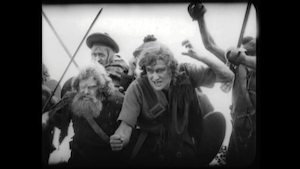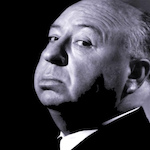Affectionately known as ‘HippFest’ this annual event produced by Falkirk Community Trust, is Scotland’s only festival dedicated to silent film and runs from Wed 20 – Sun 24 March 2019.
The Festival’s five day programme is packed with feature screenings, world-class live music accompaniment, talks, workshops and tours. One of this year’s highlights is the UK premiere of the restoration of Conan Doyle’s Hound of the Baskervilles (1929) – the final Sherlock Holmes made in the silent era and missing, believed lost for decades. Boasting a truly international cast – six leads from six different countries, German director, Danish cinematographer and Scottish author – this film has all the mystery and fun an audience would expect, including spooky suits of armour, a dastardly villain creeping about the shadowy ancestral Baskerville home, foggy moors and of course, Watson alongside the world’s most popular detective in deerstalker hat.
Alison Strauss, Festival Director said:
We are delighted to be staging our 9th Hippodrome Silent Film Festival this March. Hound of the Baskervilles is one of several feature films we will be screening that highlight the extraordinary achievements of cooperation between people and between nations during the silent era.
The 35mm nitrate print of this version of Hound of the Baskervilles was discovered 10 years ago in the basement of a Polish priest and had long been the holy grail of the silent film world. The film was directed by German director Richard Oswald and this surviving print had only Czech intertitles. It was fully restored by the San Francisco Silent Film Festival and Poland’s National Film Archive last year and premiered at the San Francisco Silent Film Festival in June 2018. During HippFest the film will be screened twice with live piano accompaniment from musician Mike Nolan and with English intertitles.
Robert Byrne, President, Board of Directors at San Francisco Silent Film Festival said:
I am delighted to be coming over to Scotland to see Hound of the Baskervilles screened at HippFest. This was one of the most complicated reconstructions the SFSFF had ever undertaken – a German film, with Czech titles, in a Polish archive – it was never going to be easy, but the end result is startlingly good and an exciting interpretation of the Sherlockian classic, with very high production values and starring a truly international cast. I hope audiences in the UK enjoy it as much as they did in 1929.

Other films screening this Festival include The Red Heroine (1929) – the oldest surviving Chinese martial arts film starring Fan Xuepeng who was one of the first stars of the genre and an influential figure in the Chinese film industry; the world premiere of a new restoration of Au Bonheur Des Dames (1930) which portrays all the glitz and glamour of a Parisian department store, and at the same time a damning portrait of rampant consumerism and the demise of small, local shops; the world premiere of the Imperial War Museum’s latest digital restoration project (following their high-profile collaboration with Peter Jackson on They Shall Not Grow Old): Peace on the Western Front; and a rare screening of Rob Roy (1922) filmed in the Trossachs and nearby Stirling Castle and accompanied by a new score commission, written and performed by multi-instrumentalist David Allison.
Further notable music commissions and collaborations include Jane Gardner, Roddy Long and Frank Bockius who will premiere a new score for Forbidden Paradise (1924) directed by Ernst Lubitsch and starring screen-diva Pola Negri; Stephen Horne five times winner of the Silent London ‘best screening with a single accompanist award’ will close the festival with a new semi-improvised accompaniment for Hindle Wakes (1927) – a rousing British drama, set in Lancashire mill towns, about a strong-minded young woman who challenges the Edwardian values and sexual double standards of her community; a new score composed by Lillian Henley for silent film pioneer Lois Weber’s The Blot (1921); Norwegian/Scottish folk duo Marit Fält and Rona Wilkie who have been commissioned by HippFest to write their first-ever silent film score to accompany Laila (1929) – an epic-scaled romantic drama set in Norway amongst the Sami people; and German musicians Frank Bockius and Günter Buchwald who have been brought together to collaborate with British musician Jonny Best (the Director of the Yorkshire Silent Film Festival), on lavish British-German co-production Moulin Rouge (1928).
Comedy highlights include slapstick star Harold Lloyd in The Freshman (1925); a late-night screening of haunted-house mystery The Cat and the Canary (1927) – described as Agatha Christie meets Scooby Doo with a generous dash of German expressionism; unexpectedly light-hearted comedy-drama in The Parson’s Widow (1920) from the famously dour Director Carl Theodor Dreyer; and, on the back of the new Stan and Ollie film, HippFest once again celebrates this comic duo’s early career with a triple bill of some of their finest moments.
 The Festival’s talks programme, with UK and US academics, Toby Haggith from the Imperial War Museum, and Holmes expert (actor/novelist) David Stuart Davies, includes a look at The Birth of Horror, the rise of the spook era of the 1920s and the dark genius of Alfred Hitchcock; Holmes of the Movies – the world’s best known fictional detective as represented on screen; the rise of the peace movement after the war (Peace on the Western Front); and the changing roles of working women in the 1920s in Kitty the Telephone Girl.
The Festival’s talks programme, with UK and US academics, Toby Haggith from the Imperial War Museum, and Holmes expert (actor/novelist) David Stuart Davies, includes a look at The Birth of Horror, the rise of the spook era of the 1920s and the dark genius of Alfred Hitchcock; Holmes of the Movies – the world’s best known fictional detective as represented on screen; the rise of the peace movement after the war (Peace on the Western Front); and the changing roles of working women in the 1920s in Kitty the Telephone Girl.
HippFest’s Youth Engagement Programme includes primary school workshops on Foley sound effects and how they can change our understanding of the meaning of film; workshops with local youth clubs; and a new short silent film produced by Falkirks Champions Board (young people who have been, or are currently in care) as part of Cashback for Creativity. At New Found Sound music students from schools in the Falkirk area will come together to accompany a selection of silents from the National Library of Scotland’s Moving Image Archive.
Finally, at Bo’ness and Kinneil Railway on Saturday night, Platform 2 will be the venue for one of the biggest tickets of the festival – action packed double-bill of The Railroad Stowaways (1926) (starring Perthshire-born Andy Clyde) and The Railway of Death (1912): a French Western, full of death-defying stunts, hi-jinks, shoot-outs and hijacked engines.










